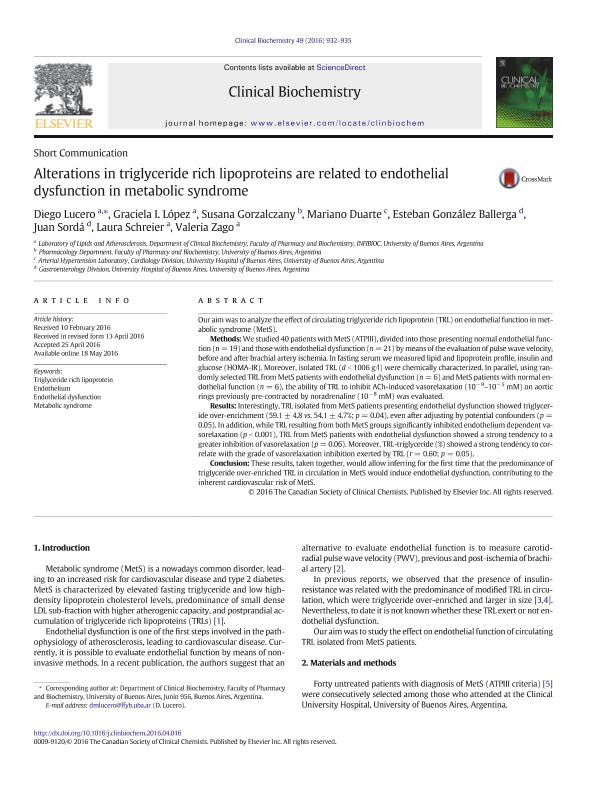Artículo
Alterations in triglyceride rich lipoproteins are related to endothelial dysfunction in metabolic syndrome
Lucero, Diego Martín ; López, Graciela I.; Gorzalczany, Susana Beatriz; Duarte, Mariano; González Ballerga, Esteban; Sordá, Juan; Schreier, Laura Ester; Zago, Valeria
; López, Graciela I.; Gorzalczany, Susana Beatriz; Duarte, Mariano; González Ballerga, Esteban; Sordá, Juan; Schreier, Laura Ester; Zago, Valeria
 ; López, Graciela I.; Gorzalczany, Susana Beatriz; Duarte, Mariano; González Ballerga, Esteban; Sordá, Juan; Schreier, Laura Ester; Zago, Valeria
; López, Graciela I.; Gorzalczany, Susana Beatriz; Duarte, Mariano; González Ballerga, Esteban; Sordá, Juan; Schreier, Laura Ester; Zago, Valeria
Fecha de publicación:
08/2016
Editorial:
Pergamon-Elsevier Science Ltd
Revista:
Clinical Biochemistry
ISSN:
0009-9120
Idioma:
Inglés
Tipo de recurso:
Artículo publicado
Clasificación temática:
Resumen
Our aim was to analyze the effect of circulating triglyceride rich lipoprotein (TRL) on endothelial function in metabolic syndrome (MetS). Methods We studied 40 patients with MetS (ATPIII), divided into those presenting normal endothelial function (n = 19) and those with endothelial dysfunction (n = 21) by means of the evaluation of pulse wave velocity, before and after brachial artery ischemia. In fasting serum we measured lipid and lipoprotein profile, insulin and glucose (HOMA-IR). Moreover, isolated TRL (d < 1006 g/l) were chemically characterized. In parallel, using randomly selected TRL from MetS patients with endothelial dysfunction (n = 6) and MetS patients with normal endothelial function (n = 6), the ability of TRL to inhibit ACh-induced vasorelaxation (10− 9–10− 5 mM) on aortic rings previously pre-contracted by noradrenaline (10− 8 mM) was evaluated. Results Interestingly, TRL isolated from MetS patients presenting endothelial dysfunction showed triglyceride over-enrichment (59.1 ± 4.8 vs. 54.1 ± 4.7%; p = 0.04), even after adjusting by potential confounders (p = 0.05). In addition, while TRL resulting from both MetS groups significantly inhibited endothelium dependent vasorelaxation (p < 0.001), TRL from MetS patients with endothelial dysfunction showed a strong tendency to a greater inhibition of vasorelaxation (p = 0.06). Moreover, TRL-triglyceride (%) showed a strong tendency to correlate with the grade of vasorelaxation inhibition exerted by TRL (r = 0.60; p = 0.05). Conclusion These results, taken together, would allow inferring for the first time that the predominance of triglyceride over-enriched TRL in circulation in MetS would induce endothelial dysfunction, contributing to the inherent cardiovascular risk of MetS.
Archivos asociados
Licencia
Identificadores
Colecciones
Articulos(OCA HOUSSAY)
Articulos de OFICINA DE COORDINACION ADMINISTRATIVA HOUSSAY
Articulos de OFICINA DE COORDINACION ADMINISTRATIVA HOUSSAY
Citación
Lucero, Diego Martín; López, Graciela I.; Gorzalczany, Susana Beatriz; Duarte, Mariano; González Ballerga, Esteban; et al.; Alterations in triglyceride rich lipoproteins are related to endothelial dysfunction in metabolic syndrome; Pergamon-Elsevier Science Ltd; Clinical Biochemistry; 49; 12; 8-2016; 932-935
Compartir
Altmétricas



